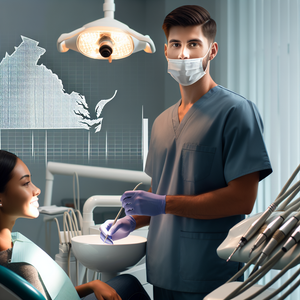The Impact of Specializations on Dentist Earnings

Dentistry comprises several branches, each focusing on specific aspects of oral health. The following are some of the most prominent specializations: - **Orthodontics**: This specialty involves diagnosing and treating dental and facial irregularities, primarily through braces and other corrective devices. Orthodontists work closely with patients to create tailored treatment plans that enhance both function and aesthetics. - **Oral Surgery**: Oral surgeons perform surgical procedures on the mouth, jaws, and face, which can include tooth extractions, implant placements, and corrective jaw surgeries. Their work often requires advanced skills and knowledge of anesthesia. - **Pediatric Dentistry**: This branch is dedicated to the dental care of infants, children, and adolescents, emphasizing preventive care and the unique dental needs of younger patients. Pediatric dentists focus on creating a comfortable environment to help alleviate children's fears about dental visits. - **Periodontics**: Focused on the treatment of gum disease and supporting structures of teeth, periodontists play a vital role in maintaining oral health. Their work often involves surgical and non-surgical interventions to treat various periodontal conditions. - **Endodontics**: This specialty involves treating issues related to the dental pulp and root tissues, commonly known for root canal therapy. Endodontists are crucial in preserving teeth that might otherwise require extraction.
Earnings Potential Across Specializations
The earning potential of dentists varies widely based on specialization. According to recent data from the American Dental Association (ADA), the average annual salary for general dentists is approximately $180,000. In contrast, specialized fields tend to yield higher incomes: - **Orthodontists** can earn upwards of $250,000 annually, with many in high-demand urban areas exceeding this figure. Their services are often sought after by patients looking for both functional and aesthetic improvements. - **Oral Surgeons** often report earnings in the range of $300,000 to $400,000, reflecting the complexity and risk associated with surgical procedures. Due to the nature of their work, oral surgeons may also have opportunities for emergency services, further enhancing their income. - **Pediatric Dentists** typically earn between $180,000 and $220,000, with income influenced by factors such as location and patient volume. Their ability to build long-term relationships with families can contribute to a stable patient base. - Other specialties, such as periodontics and endodontics, also offer lucrative salaries, often ranging from $200,000 to $300,000. The increasing awareness of oral health and preventive care has spurred demand for these specialists.
Educational Pathways and Investment
Pursuing dental specialization requires additional education and training. After completing a dental degree, dentists must attend a residency program specific to their chosen field, which can take an additional 2 to 6 years. This extended training not only increases the financial investment in their education but also provides specialized knowledge essential for their practice. For instance, orthodontics requires a master's degree in addition to dental school, further extending the time before these professionals can begin earning a substantial income. Investments in education can also lead to student debt, which varies based on the dental school attended and the length of the residency program. Graduates must weigh these financial burdens against potential earnings to make informed career decisions.
Career Longevity and Market Demand
Specialization can influence career longevity and job satisfaction. Many dentists find that specializing allows them to practice in areas they are passionate about, which can lead to greater job satisfaction. For instance, orthodontists often report high levels of job satisfaction due to the transformative results they provide to patients. However, market demand plays a crucial role in ensuring that these specialties remain viable long-term. For example, the demand for orthodontists has surged with the rising popularity of cosmetic dentistry and clear aligner technology. Conversely, a saturated market in a specific area may limit earning potential regardless of specialization. Economic factors, such as the local population's demographics and disposable income, can also impact the success of specialized dental practices.
The realm of dentistry offers diverse opportunities for specialization, each with its own unique implications for earnings, career trajectory, and job satisfaction. As dental professionals navigate their paths, understanding the financial and educational investments required for each specialty is essential. While general dentistry provides a solid foundation, those who choose to specialize can unlock higher earning potentials and greater job fulfillment. Ultimately, the decision to pursue a specialization should align with both personal interests and market demands, ensuring a successful and rewarding career in dentistry. The increasing complexity of oral health care, coupled with evolving patient expectations, suggests that specialized dental practices will continue to thrive, reflecting the dynamic nature of the healthcare economy.
Orthodontic Assistant
Orthodontic practices, dental clinics, and hospitals
Core Responsibilities
Assist orthodontists during procedures, including the placement of braces and spacers.
Take and develop dental radiographs to help with patient diagnosis and treatment planning.
Educate patients about oral hygiene and care of orthodontic appliances.
Required Skills
Strong communication skills to interact with patients and their families effectively.
Knowledge of dental terminology and procedures related to orthodontics.
Experience with dental software for patient records management.
Oral Surgery Nurse
Oral surgery clinics, hospitals, and outpatient surgical centers
Core Responsibilities
Provide pre-operative and post-operative care to patients undergoing oral surgery.
Assist surgeons during procedures by managing surgical instruments and monitoring patient vitals.
Educate patients about recovery procedures and manage pain relief protocols.
Required Skills
Current nursing license and certification in Advanced Cardiac Life Support (ACLS).
Strong organizational skills and attention to detail in a surgical environment.
Familiarity with anesthesia protocols and surgical instruments.
Pediatric Dental Hygienist
Pediatric dental offices and family dental practices
Core Responsibilities
Perform dental cleanings, fluoride treatments, and sealant applications specifically for children.
Educate children and parents on proper dental hygiene practices and preventive care.
Assist pediatric dentists in managing anxious or fearful young patients during examinations.
Required Skills
Certification in pediatric dental hygiene or experience working with children.
Ability to communicate effectively with children and their guardians.
Patience and a compassionate demeanor to create a welcoming environment for young patients.
Periodontal Technician
Periodontic practices and multidisciplinary dental clinics
Core Responsibilities
Assist periodontists during surgical and non-surgical procedures related to gum disease treatment.
Perform diagnostic tests and gather clinical data to aid in treatment planning.
Educate patients on periodontal health and maintenance strategies post-treatment.
Required Skills
Knowledge of periodontal disease and treatment protocols.
Proficiency in using dental imaging and diagnostic tools.
Strong interpersonal skills to support patients during treatment.
Endodontic Specialist
Endodontic specialty practices and dental hospitals
Core Responsibilities
Perform root canal treatments and other procedures to save damaged or infected teeth.
Diagnose and treat dental pulp diseases, utilizing advanced imaging techniques.
Collaborate with general dentists to manage patient referrals and treatment plans.
Required Skills
Completion of an endodontic residency and board certification.
Proficiency in using specialized endodontic tools and technologies, like cone-beam CT imaging.
Strong problem-solving skills to address complex dental issues.


